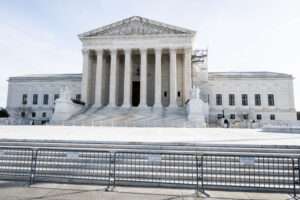The Volokh Conspiracy
Mostly law professors | Sometimes contrarian | Often libertarian | Always independent
The Danger of Trump Disobeying Court Orders [Updated]
The administration may be moving in that direction. If it does so and gets away with it, the consequences are likely to be dire.

The new Trump administration may be heading in the direction of disobeying court orders that go against it. If they do so and get away with it, there are likely to be dire consequences for our constitutional system. An administration not bound by court orders is ultimately not bound by the Constitution and the laws, either.
Evidence indicates that the Trump administration is in violation of court orders in as many as three separate cases. A federal court in Rhode Island has ruled that they violated its previous order barring Trump's funding freeze on federal grants. There are also indications that the administration has violated court orders against policies freezing federal grants from the National Institute of Health and FEMA.
At the same time, top administration officials including VP J.D. Vance have implied that the administration has the power to violate court orders.Vance says that "[j]udges aren't allowed to control the executive's legitimate power." Top Trump adviser Stephen Miller asserts there is no "line in the Constitution where it says a lone unelected district judge can assume decision-making control over the entire executive branch." This despite the fact that Miller himself – along with other conservatives – supported similar lawsuits and judicial injunctions issued by "lone" district judges against Biden Administration policies, such as student loan forgiveness.
As yet, it is not completely clear that the administration plans to systematically defy court orders that go against it. Violations that have occurred so far might be a result of incompetence or disorganization. And it is possible to parse Vance's statement in a way that avoids endorsing defiance of judicial rulings. But the combination of multiple violations and statements by high officials apparently condoning such behavior is ominous, to say the least. If Vance and other administration officials don't really mean to endorse defiance of judicial rulings, they could easily say so.
Federal court decisions blocking implementation of illegal administration policies are a fundamental element of our system of judicial review. Article III of the Constitution states that "The Judicial Power shall extend to all Cases, in Law and Equity, arising under this Constitution, the Laws of the United States, and Treaties made, or which shall be made, under their Authority." That obviously includes cases challenging the legality of policies adopted by the executive branch. And, just as obviously, courts cannot exercise that authority effectively if the executive (or anyone else) is free to disregard rulings they don't like.
Some defenders of Trump's actions cite Biden's policies on student loan forgiveness as a kind of precedent. Biden did boast that the Supreme Court's (correct) ruling in Biden v. Missouri "didn't stop me" from forgiving student loans. Nonetheless, when the Court ruled that he didn't have the authority to engage in massive loan forgiveness under the 2003 HEROES Act, Biden obeyed the ruling. He did then try to engage in large-scale loan forgiveness under another statute, the Higher Education Act. But when courts predictably ruled Biden couldn't do a massive loan forgiveness plan under the HEA, either, Biden obeyed those rulings, as well.
Biden's actions in the student loan saga were reprehensible and illegal, and I said so at the time. But he did not disobey any court orders, as Trump may now do.
If the president is able to defy or ignore court orders against him, then the executive branch would be effectively free of legal constraints on its actions - including those of the Constitution. It could violate constitutional rights, usurp the authority of Congress (as Trump is trying to do with his wide-ranging assault on the spending power), and more. In that scenario, we would no longer have a constitutionally constrained federal government, except perhaps in name only.
We aren't there yet. But to prevent it, courts, key political actors - preferably in both parties - and the public must make clear that executive defiance of judicial rulings is unacceptable and intolerable. Trump can be forced to back down from this extremely dangerous precipice. Whether enough of us have the will to make him do so remains to be seen.
UPDATE: Trump has now said he will obey court orders. It's good he said that. But, given the pattern of events described above, and Trump's extensive history of lying, we should not just take him at his word. Rather, it's important to deter defiance by continuing to bring as much political pressure to bear as possible.


Show Comments (116)